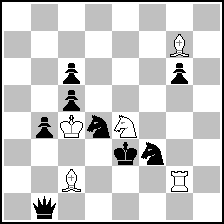
Website founded by
Milan Velimirović
in 2006
23:09 UTC


| |
MatPlus.Net  Forum Forum  General General  A mix between direct and help play A mix between direct and help play |
| |
|
|
|
|
You can only view this page!
| | | (1) Posted by Hauke Reddmann [Saturday, Jan 19, 2019 19:33] | A mix between direct and help play
Here is a random fairy idea that popped up in another context.
Assume White and Black have (identical or different) goals and
trying to reach your own goal may help the opponent - perhaps
even more than it helps you.
It's not easy to come up with an example, but I just had an idea.
In Progressive Chess (name?), White plays 1 move, Black 2,
White 3 and so on. Change that to Optional Progressive:
You have the right to progress, but you may renounce. (Maybe
your opponent can mate you in 3 for any two move you play,
but if he has only 2 moves, with your one before you can escape.
And then use 3 against him.)
Or think about a neutral queen on d1, both players want to
reach h8 when it's their move.
Hauke
| | | (2) Posted by Kostas Prentos [Sunday, Jan 20, 2019 00:59]; edited by Kostas Prentos [19-01-20] |
I used to play progressive chess by (email) correspondence more than two decades ago. The nature of the game is quite straightforward: Grab your opponent's pieces and win the endgame, provided that no series-mates were overlooked. As such, it was rather easy to analyze the game (at least, much easier than traditional chess). Back then, the consensus among players who took the game a bit more seriously was that white had a decisive advantage. Recently, I saw a synopsis by one of the guys from those days, who kept playing the game. See #12 here: It turns out, it is a forced draw.
In any case, back then, in order to mix up things a bit, I had exactly this idea: Any player can play any number of moves, up to one more than the number of moves played in the last move by his/her opponent. I never tried it seriously, but here is a bit more info:
Another way to complicate matters is to play progressive chess with Fischer Random (Chess960), or with limited time (blitz).
| | | (3) Posted by Sarah Hornecker [Sunday, Jan 20, 2019 03:35]; edited by Sarah Hornecker [19-01-20] |
I think Hauke's idea is seen in reflexmates and to a lesser extent selfmates a lot.
White often runs into the obstacle that he would have to give checkmate if he straightforward carries out his plan. So he must prevent that first, so he doesn't help his opponent.
The wonderful selfmate by Mr. Oganesjan posted one or two weeks ago in the forum is a good example. White can carry out his plan but checkmates then. So he must shut off his bishop first to not help his opponent accidentally. Ralf Krätschmer explored the theme in directmates - see "Berlin-Thema".
| | | (4) Posted by Neal Turner [Sunday, Jan 20, 2019 10:56] |
A similar idea is found in the neglected genre of the reflex helpmate - a helpmate with reflex rules.
Here we're trying to reach the goal while avoiding giving Black a chance to mate during the sequence.
neal turner
British Chess Magazine 1990
 (= 5+8 ) (= 5+8 )
Reflexhelpmate in 2
1.Se6? Sf6/Sf2 2.Se5/Sd2#
1.Se2! Sf2! (1..Sf6? 2.Qxc2#) 2.Sf4 Sg4#
| |
No more posts |
MatPlus.Net  Forum Forum  General General  A mix between direct and help play A mix between direct and help play |
|
|
|
 ISC 2024
ISC 2024 Forum
Forum  General
General  A mix between direct and help play
A mix between direct and help play 


